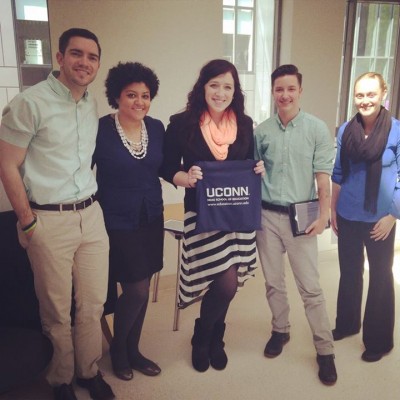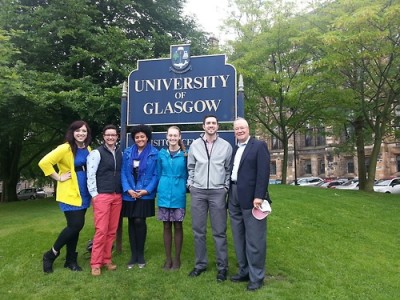“The Glasgow Five” is not the name of a new European rock band or infamous team of criminals, but the nickname adopted by the five Neag School of Education students who recently spent three weeks in Scotland studying how the University of Glasgow could best use social media to recruit, prepare and support international students.
It was the second trip of its kind for UConn students working toward a master’s degree in Higher Education and Student Affairs (HESA), but by no means the last, said HESA professor and UConn Provost Emeritus Peter Nicholls, Ph.D., who played a lead role in coordinating the visit.
The first visit, in the summer of 2013, involved a different team of five HESA students working alongside University of Glasgow staff. Their project involved a detailed analysis of expectations of incoming international undergraduates to the University of Glasgow, and the development of recommendations for the University to meet those expectations. This initial visit was such a success that the University of Glasgow was keen to welcome another team in the summer of 2014.
“I don’t think there could be better praise than that,” said Nicholls, “and their job was huge. This was not a vacation. Our students developed research questions, mapped out a methodology, conducted focus groups, analyzed data, interpreted statistics and then presented what turned out to be concise and compelling recommendations for improvements. University of Glasgow staff were very impressed by the analytical approach and the quality of the assessment analysis that our students performed during the summer of 2013.”

Using the knowledge they had gained during their first year of study in the 44-credit HESA program, the second group of five students, comprising of Caroline Green, Jackie Lee, Em Loisel, Ty McNamee and Eileen Rodriguez conducted their project on the use of social media by prospective and current University of Glasgow students. As a part of this project, there was regular contact between the five students and HESA faculty in Storrs, who monitored their progress and provided needed support and troubleshooting.
Their findings became a part of the University of Glasgow’s institution-wide social media strategy—a needed part of university marketing that most expect to grow.
“Like in so many areas of life, social media has become an essential part of both Student Affairs and the overall higher education learning process,” said HESA Program Director and Department of Educational Leadership Extension Professor Sue Saunders, Ph.D. “Facebook, blogs, Flickr, Twitter and similar social platforms are redefining how students speak to universities and how universities engage with students, potential students, alumni and other constituencies. All of us involved in higher education, regardless of our roles, need to learn social media practices, which are constantly evolving.”
Because having a global perspective is essential for students considering almost any field today, this Higher Education and Student Affairs International Experience (HESA IE) program will continue, Nicholls said. Brought out of retirement in 2013 to begin the program, Nicholls will spend the rest of 2014 strengthening and expanding the opportunities it provides to HESA students, which he hopes might soon include those at other Universitas 21 schools.
UConn is one of just four universities in the United States to belong to Universitas 21, a global network of 24 research-intensive universities dedicated to fostering global citizenship, advancing institutional innovation and facilitating an exchange of ideas and knowledge that might otherwise never have occurred. The University of Glasgow is also a member.
Like those who traveled to Scotland in 2013 and 2014, future HESA IE students will be tasked with addressing a Student Affairs-related problem posed by the partner institution and, upon their return to UConn, complete a three-credit elective that explores the application of higher education and student affairs concepts in a global context. Nicholls and Neag School Associate Dean Marijke Kehrhahn, Ph.D., will teach the class in fall 2014.
“Like the HESA program and Neag School of Education overall, the foundational pedagogy of the international experience is to connect classroom theories with actual practices by putting students into challenging real-world situations,” Nicholls said.
“The hardest part of the International Experience for our students is to analyze a real world problem, and propose meaningful recommendations for the host institution within a very compressed timeframe and in unfamiliar surroundings,” Nicholls added. “But there’s something really special that occurs when a small group of extremely dedicated, motivated students work together with the mindset that they’re going to make the most of every moment. Add the fact that these students have received outstanding training in research methods, and it all comes together beautifully.”
For student Jackie Lee, that experience in Scotland felt like just a moment ago: “We definitely found the experience to be impactful both personally and professionally. We believe what we’ve learned is beneficial to share with others and hope to keep moving forward, sharing ideas, best practices and supporting fellow student service professionals worldwide.”
Click here to learn more about their research.



